Actualidad educativa
Summary of the conference held on May 24, 2016 at the INTEF, Madrid
Summary of the conference held on May 24, 2016 at the INTEF, Madrid09/06/2016
On May 24, 2016 in c / Torrelaguna 58, Madrid, organized by the National Institute of Educational Technologies and Teacher Training. Ministry of Education, Culture and Sport. Whose objectives were:
- Presenting the framework of digital competence in educational organizations designed by IPTS and a development agenda.
- Determine the current situation regarding the digital competence of educational organizations at international, European and Spanish level.
- Analyze the impact of the digital transformation of educational organizations in the current and future education.
- Discuss proposals to advance the implementation of digital competence in educational organizations.
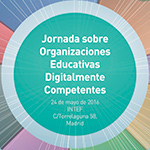
Opening speech by José Luis Blanco López, General Director of Evaluation and Territorial Cooperation.
José Luis Blanco opens his speech pondering that, in the past, from the moment that thoughts about the digitalization of education started, that process was based mainly on three foundations: devices and infrastructure, educational materials and teacher training.
In 2012, however, the INTEF proposes the Digital Culture Plan in the School, with seven foundations and a more systemic approach. The Connectivity project for Schools, approved in 2015, included a planned investment of 330 million euros for connecting every Spanish school to the Internet via Ultrafast Broadband. Both the projects for Open Educational Resources (OER) and the General Educational Pay Resources Catalog, were also included.
The INTEF also led the Digital Competence Framework for Teachers project, which is being proposed at this time as a reference at European level. The Interoperability project, which involves a single ID for students, is introduced. The Areas of collaboration with the Autonomous Communities and the Web and social networks, are the final projects of the Plan.
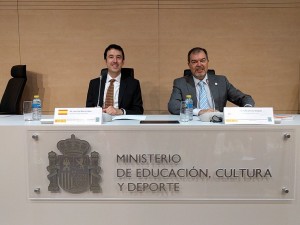
Yet there are still missing elements to complete the plan, such as students, which requires a "digital competence of students". That is not only a key competency, but a core competency. Another essential element is the family, who are necessary as for searching for ways to be integrated in the digital education system.
Finally schools, which provide a public service, are affected in their pedagogical and organizational performance by ICT. Hence, the importance of this event which puts the focus of the next few years in this essential piece to address the digitalization of education.
Summary of the round table with international representatives
In this first round table, the participants were:
- Yves Punie: Yves Punie is a senior scientist at the Institute of Technological prospective studies of the European Union (JRC IPTS), and conducts research on "ICT for learning and skills".
- Alexander Khoroshilov: Alexander Khoroshilov is the Officer-In-Charge of UNESCO Institute for Information Technologies in Education (UNESCO IITE).
- Anusca Ferrari: Anusca Ferrari is the project manager of Digital Skills of European Schoolnet.
- The table was coordinated by Félix Serrano Delgado, Director of INTEF.
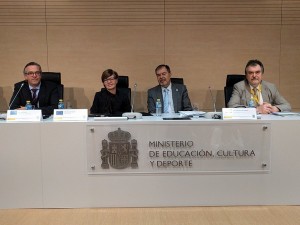
In his presentation, Yves Punie shows the Framework of Digitally Competent Educational Organizations in the European Union, prepared by the Institute for Prospective Technological Studies (IPTS). IPTS is a research institute to support EU policies in socio-economic, scientific or technological issues.
Currently, there are many initiatives but lack an understanding and a common reference to foster transparency, benchmarking and improvement. It is necessary to learn from each other and not to reinvent the wheel.
This framework helps the progressive incorporation of ICT into educational organizations in order to improve education in all areas and to adapt to the digital age. It is a complete, scientific framework and has been validated by experts and stakeholders, and it also focuses on holistic and systemic change.
It includes a self-reflection and a self-assessment tool for educational organizations as well as an evaluation guide for educational policy on integration and effective use of digital learning technologies.
The pilot of this project will be verified in 2016-2017 in four countries, including Spain.
Professor Alexander Khoroshilov first analyzes the impact and challenges of ICT in Education. He raises its horizon on education by the year 2030. He was wondering which represents the book for children in class by then. He also wondered how to combine customization with mass education.
To solve new collaborative learning environments, a new generation of interactive textbooks is needed. Above all, it is necessary to apply the Digital Framework of Teachers' Competence developed by UNESCO. They have already developed the second version and are developing the third. And finally, he claims it is very important to integrate pedagogy and technology.
He wraps his intervention up by explaining that UNESCO's current activities focus on policy development, teachers' training, mobile learning, open educational resources, and monitoring and measuring.
Last but not least, Anusca Ferrari, after presenting European Schoolnet, claims that digital skills are a right to every student, since they are basic skills to be taught at every school. As an example of European Schoolnet activities, Ms Ferrari presents various projects:
The Living Schools Lab project has been developed in twelve countries, connecting leading innovative education institutes with others, interested in starting this process. In this project a virtuous cycle of the different elements that produces continuous improvement, is used.
Another project is the Future Classroom Lab, a room in which all industries present their examples of how they see the application of technology in the classroom, including furniture that can be adapted to work in groups or individually.
She also explains about the Academy of European Schoolnet, which offers free courses to develop the digital competence of teachers. Back in September they held a MOOC with 1800 students, out of whom more than 700 ended successfully.
Finally, she presents the MENTEP project, in which the Spanish Ministry of Education also participates, with a self-assessment tool that allows teachers to reflect on their teaching process and how it improves with technology.
The final thought is that we still may not get generalized innovation in education, but can go expanding the innovative circle more and more.
Summary of the round table with educational representatives of Spanish regional governments.
In this second table, different education authorities were involved to discuss and exchange views on the cornerstone of the day: the digital competence of educational organizations.
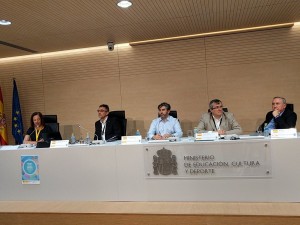
The table is moderated by María Jesús García San Martín, Head of Networked Training at INTEF and the members of the table were as follows:
- José Alberto Hernandez Gañán is Chief of service of Teacher Training of the Directorate General for Innovation and Educational Equity of the Ministry of Education of Castile and Leon.
- Juan Pablo Pulido is Head of information and communications technology in the General Secretariat of Education, a unit that coordinates and manages the political and educational services science and technology of Junta de Extremadura.
- Jordi Vivancos Martí is head of the Department of Technology for Learning and Knowledge of the Ministry of Education of the Generalitat de Catalunya.
- Mikel Agirregabiria is the Head of Service of Educational Innovation in the Basque Government.
We start with an initial question for all the members of the panel, which tries to foster that each table member describes the situation in their regions: "How is digital competency currently being measured today in the context of your education authorities?"
There are assorted answers, since in each territory they have been taking steps regarding digital competency, at different speeds and with different criteria, although what we all do agree on is the need to measure and assess this competency somehow.
For example, in the case of Castilla y Leon, José Alberto Hernández states that they are in the process of reviewing and updating their 2010 model including Digital Teacher Competence within a framework of professional skills for teachers. Currently, they have a model of Digital Teacher Competence with an online, open, self – assessment tool that aims to shape and adapt training activities designed at the region.
In his opinion, Juan Pablo Pulido points out that in Extremadura, they have been working for 2 years in descriptors to develop the portfolio of the Educational Digital Competence, and they have already approximately 70 descriptors and intend to publish an online questionnaire for the teacher, so that the teacher can locate and evaluate their Digital Competence.
Then intervenes Jordi Vivancos, who states that in Catalonia, Digital Teaching is linked to the methodological and innovation competencies, as they think that Teaching Digital Competence cannot be isolated from other competencies. Moreover, they also work assessing Digital Competence of students and, since 2013, they have determined their output levels.
Finally, to close this first round of speeches, took the floor Mikel Agirregabiria, who explains that the project "ICT Maturity" would be the most advanced in the field of Digital Teaching Competence. Regarding this competency, they have tried to adapt the INTEF framework to the reality of their centers mainly through teachers playing the role of ICT facilitators. As part of an agenda for the Digital Competence of Citizenship, he refers to the Ikanos project for schools self-assessment, oriented mainly to the school staff.
It is concluded by the interventions of the participants of the table that in their educational fields there is a firm commitment to work to have digitally competent teachers and schools, and that they all consider necessary to have digitally competent teachers and digitally competent schools, and the need to acknowledge such a competency. However, until now, everyone there have been doing so without common criteria or collaborative work.
That is why to finish the table, the final question is twofold: first, "Are we likely to start a journey together in the acknowledgement of digital competency?" And second: "How can we value and / or recognize/acknowledge the digital competency of a school without doing the same with the teachers' digital competence?"
Starts speaking Mikel Agirregabiria in this second round, stressing the importance of the figure of the ICT facilitator in schools, to whom we should acknowledgethe fostering role of digital competence facilitator, which should not be confused with a maintainer of equipment and troubleshooter. The draft of ICT Maturity of Schools in the Basque Country is the centerpiece of his speech.
Jordi Vivancos announces that, in Catalonia, for 2016 and 2017, a skills tree is envisaged for implementation, and that, from their point of view, it would be interesting to link Teachers' Digital Competence descriptors to it. In addition, they have teachers' portfolios under study, so they can provide evidence of work in the classroom, but he considers difficult to assess those portfolios, as it is not easy to establish a relationship between the portfolios and the descriptors of Teachers' Digital Competence.
Then, Juan Pablo Pulido raises the problem of what to do with the acknowledgement of Teachers' Digital Competence. From Extremadura they wish to promote the teaching profession, and Juan Pablo raises the need for a requirement for teachers, ICT Competence of Teachers, from the beginning. He concludes that it is not admissible to allow us to introduce in the public system, teachers who are not trained enough, or who are digitally incompetent.
Finally intervenes José Alberto Hernández, who explains that in Castilla and Leon, digital competence is included in a framework of professional skills for teachers. Their Digital Competence model includes 4 dimensions, 130 descriptors and is currently used in this autonomous region.
Summary of the round table with representatives of the education sector
In this third table were involved:
- David Álvarez is member of Conecta13, a company that develops various online training projects.
- Javier González Casado is Manager in Telefonica Foundation in the area of Education.
- Oscar Martin Centeno is Principal of the Santo Domingo Center for Early Childhood Education, Elementary and Secondary Education, in Madrid, and Chairman of the Board of Directors of Madrid.
- Silvia Pradas Montilla is a professor at the International University of La Rioja, and teaches the Official Master's Degree on Neuropsychology and Education.
The panel was moderated by Mar Jiménez López, Head of Department of Training and Institutional Relations of INTEF.
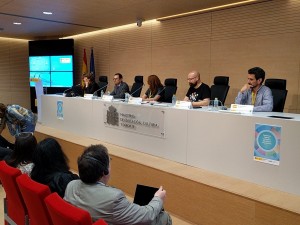
Silvia Pradas opens the panel explaining the implementation of technology in education from the point of view of Neurotechnology. The educational Neurotechnology is the blending between neuropsychology and technology for the benefit of the learning process. This field aims to provide educational responses through behavioral research of the brain during learning.
Knowledge of the human brain allows us a more positive educational vision, which makes student observable potential, and in turn, helps to address the learning difficulties. It is encouraged to develop a new model of teaching, focused on how the brains of students learn and apply the most appropriate psychoeducational and neuropsychological strategies.
rgues that the use of technology can augment sensory information, enhancing the students' skills. Therefore, she proposes to design educational programs on this line.
Oscar Centeno Martin presents his center, CEIPS Santo Domingo in Algete, Madrid.
A digitally competent center is the one that that makes technology invisible, focusing on methodology. The Santo Domingo project is based on communication as the backbone and uses technology as a fundamental tool for developing active learning initiatives. Thus, they have managed that the school, which five years ago was about to disappear, now has a long waiting list for admission.
They focus on curiosity as the key driver of learning; have developed a newspaper, radio and five channels of digital TV with learning and communication at the same time. This entails a thorough organization by working tables, Gantt charts and shared workspaces.
The keys to success are, according to Oscar, are to motivate teachers and involve families by establishing a realistic view of a change.
David Álvarez delivers his knowledge about learning, and how organizations manage knowledge and personal development.
He proposes that the schools are engines of change. Organizations should encourage the development of the members of the organization. Thus, these members can create and lead new projects, always based on a key shared leadership to success.
He explains their collaboration in the Guadalinfo project (2010), which led a free solution for managing Personal Learning Environments (PLE). Thanks to this prototype his company began to develop MOOCs where new methodologies used later, as open publishing, or blogs creation by students were implemented.
His experience has shown him that the use of blogging is essential as a space for sharing and disseminating knowledge.
Finally, to close this round table, Javier González Casado presents the book "Prepare your school for the digital society". The project aims to determine the success factors on the optimal incorporation of students to the digital society and the approach of schools. Among the keys to success established, 12 altogether, are included aspects such as the commitment of the school staff, the creation of an educational center project incorporating innovative aspects, and based on projects to improve development of learning skills. In addition, he refers to cooperative classrooms, the curriculum fit through the concept of mentoring and the need to adapt to the student.
On the other hand, Javier also addresses the role of educator, which he defines not only as a guide to the students, but as a pro-activator of change processes in the classroom. He also refers to the need for collaboration between teachers and centers and the redefinition of time in classes and breaks.
To conclude his presentation Javier explains how technology helps customization and integration of the entire educational society and discusses the need to reflect and learn how they are incorporating several key centers, and if the technology is helping in this process. The aim is to help the education system to properly perform its function.
Closing speech by Marcial Marín Hellín, Secretary of State for Education, Vocational Training and Universities
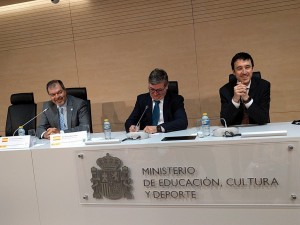
Closes the event the Secretary of State for Education, Vocational Training and Universities. Mr. Marcial Marín, after greeting the attendees, highlighted the importance of addressing the digital transformation of education putting the focus especially at school.
After a brief review of the setup and activities of the three panels, international, autonomous regions, and experts, he proposes a series of actions to be taken in order to enable this transformation:
- Developing the Framework of Digital Competence of Educational Organizations adapted to Spanish needs.
- Promoting the dissemination and knowledge, especially when training management teams and school directors.
- Providing support for the development of digital transformation plans of the centers.
- Acknowledging the achievements and successful case studies of digital transformations on schools to offer them as an example to others.
Summarized by Felix Serrano Delgado, Maria Jesus Garcia San Martin and Mar Jimenez Lopez.
Archivos relacionados
Etiquetas
- intef
- actualidad
- digcomporg
- actuality
- education authorities
- digital competition
- round table
- education sector
- educational organizations
- digitally competent educational organizations
- digital impact
- biographies
- may 24
- international organizations
